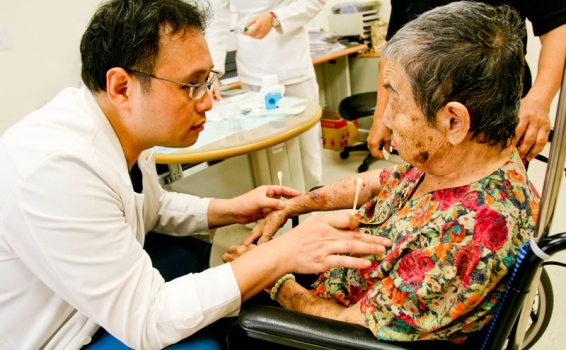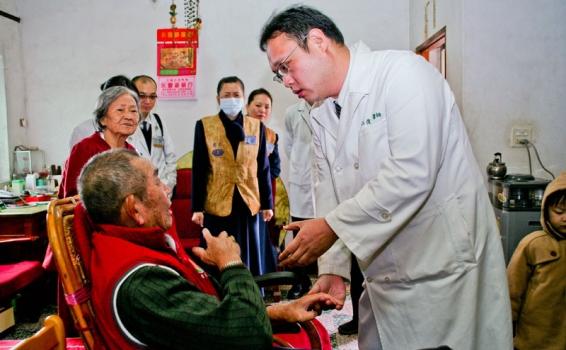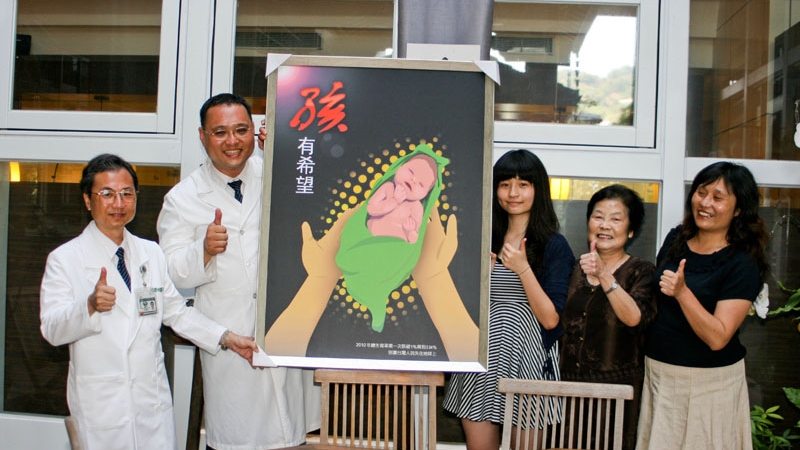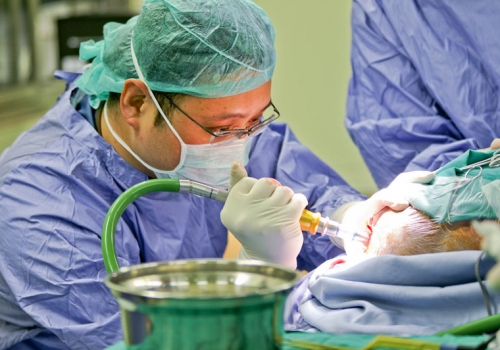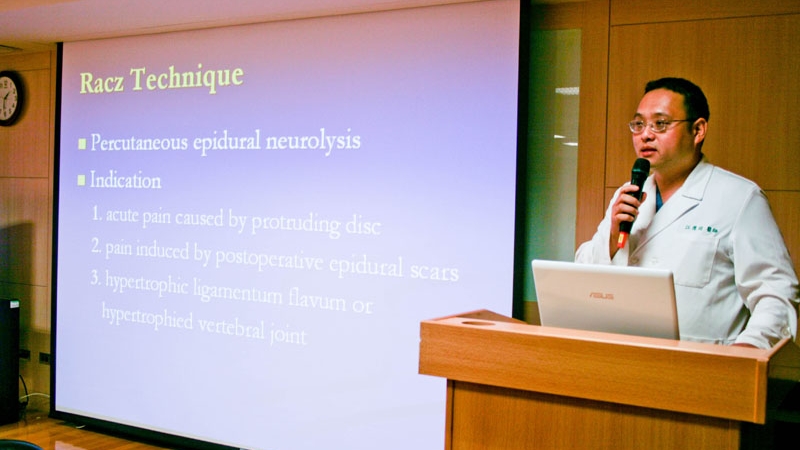Written by Dr. Chun-Ting Chiang, Neurosurgeon, Taichung Tzu Chi Hospital
A “fortunate” child, one who has an easy growing experience and promising career, must be someone like me. Plain and simple upbringing made me curious about various life styles in the society, and I wanted to try them all. There was a time when I thought the best career was to be a gangster. Today, I am thankful that life had led me to work at the Tzu Chi Hospital. I learned different ways of thinking and began a different life experience. Otherwise, I might be just a surgeon who knows how to perform surgeries for the rest of my life.
After my neurosurgeon training at the Chang Gung Hospital, I worked at a hospital in southern Taiwan. There were many “interesting and alluring” first time experiences waiting for me to explore. There were cigarettes, alcohol, betel nut, and women. I remember once a gang leader and I went to a restaurant and ate there for free. Not only did we not pay for the meal, we had the owner over and asked him, “What are you giving us after the meal?”
After joining the Tzu Chi Hospital and actively participating in senior home visits, Dr. Chun-Ting Chiang found the value of practicing medicine that he had never known.
Once a gang leader invited me to go for a drink, but I was on duty in the emergency room. One of his subordinates stood in front of the emergency room with a gun in his hand, threatening the ambulance to transfer patients to other hospitals so I could get away. At the time, I had beautiful women from nightclubs. I thought it was my happiest time in my life. At that time, I just thought that there was no pressure and responsibility in such life, and being a gangster was the best career.
Ms. Wan-Ting Chi(center), in adulthood, gives her first award painting to Dr. Chiang for saving her life. Dr. Chiang realizes the meaning of life with this painting.
The fact was that emptiness after the excitement had begun to haunt me. I didn’t know what to do if there was no alcohol. There were five days out of a week I was drunk. I was bloating like a balloon. My uric acid was so high that the joints of my entire body were aching. My health was deteriorating. Sometimes when I treated patients, I cried in pain with the patient. People could not tell who was the doctor or the patient.
After a period of the “rogue” lifestyle, plus I was the only neurosurgeon of the countryside hospital, I felt I had very limited learning and growth space. Therefore, I decided to return to my hometown in central Taiwan when Taichung Tzu Chi Hospital opened.
Prior becoming a member of Tzu Chi volunteers, my impression of Tzu Chi was “a group that has many aunty and grandmother volunteers”. In the beginning, I more or less participated in some activities. Later, I noticed the obvious behavior changes of some colleagues that had undergone Commissioner and Faith Corps training. Last year, I joined the training as well. I learned a lot from the classes. One of the most important things I learned is to reflect my own conscience and to be thankful.
The never-ending touching stories of Tzu Chi had always inspired me, and made me want to repent. Many volunteers and colleagues of the hospital had heard my confessions, but I still could not stick to the right course. My ignorance was my greatest challenge. I often wondered, “Why don’t others understand me? What is the meaning of life? How much longer can I last in this program?” I sometimes could not help but doubt myself.
It was until early April, a painting was given to me by a patient. It was like a bucket of cold fresh water pouring over my head; it made me understand there are many other things I could do besides being a surgeon.
The story began four years ago when 13-year-old Wan-Ting Chi came through the Emergency. In 2007, Chi was riding with her mom on a scooter. All of a sudden, a parked car opened its door and struck Chi onto the street. Without any time to react, Chi was run over by a passing truck. When Chi first came to the hospital, she was still awake with slight control of her legs. However, her spinal strength was dwindling and by the time she entered the operation room, her legs had lost all strength. At that time, her spinal cord was badly damaged, and I estimated that we might have a chance if we were fast enough. Conservatively, without giving the family too much hope, I said there was a possibility that she might become paralyzed, and the best scenario would be her walking with a cane for the rest of her life. The girl’s father agreed to the surgery. Surprisingly, her legs twitched three days after the operation. A month later, she could stand up on her own like a robot. Chi suspended one year of school for rehabilitation, but returned to study business design. She is now a junior in high school. The operation only results a tiny scar.
She received a first excellent award from the “National Student’s Art Competition, Preliminary Contest of Taichung County”, and gave me the painting to thank me as her savior. In fact, this painting had so much impact on me during my darkest time. I told her that she was my savior. I was so touched, not because of the time she spent on this painting but the things she said and the significance of this painting. She was going to be on a wheelchair for the rest of her life, but she not only stood up but also painted this picture. What I realized is although she fell once, but she knew as long as she held on to life, she could still shine again!
I look back and realize that the meaning of life is not how many expensive clothes I own, how much delicious food I could have eaten, or how successful my career would be, but how many things I can do and how much I can give. From the little girl, I found that I am still useful! I should give back what I can do best!
After leaving the gangsters and practicing medicine, Dr. Chun-Ting Chiang wishes he would no longer be a doctor with skills, but one who knows how to be grateful.
Recently, Dharma Master Cheng Yen was awarded the 100 most famous people around the world. She was also called a saint by foreign media. Her reputation naturally came from her real contribution to the society. She did not accept the award for herself but in honor of all Tzu Chi volunteers. I am very touched by her integrity and sincerity and I relate this to the little girl who gave me the painting as recognition of her gratitude. Her surgery involved many nameless heroes including the anesthesiologists, intensive care unit, operating room, and teams of rehabilitation nurses. If they knew about the girl who recovered well and sent us a painting, I am sure they would also be moved.
Looking back at the days with the gangsters, it was so absurd and dreamlike. If I had not encounter Tzu Chi, in such a beautiful environment to cultivate my thoughts, I might still be a doctor who only knows how to operate, and to brag about my medical skills. The gifts I received would be another flaunting evidence of my skill and ego. During the Tzu Chi Faith Corps training, my experience in volunteering and interacting with patients have become very different. This experience also helped me uncover the real me with gratefulness. I become happy and steadfast on the journey of practicing medicine. This way, I truly have become a “fortunate” child.
Dr. Chun-Ting Chiang demonstrates the Racz procedure at a conference.

